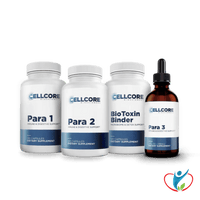Purpose
Magnesium plays a vital role in the upkeep of our health. It is also one micronutrient in which we tend to be deficient. Magnesium interacts with calcium, vitamin D and other micronutrients in several bodily processes.
Magnesium does many important things including:
- Involved in over 600 cellular reactions
- Maintains brain function
- Maintains healthy heartbeat
- Helps regulate muscle contractions
Recommended Daily Intake
The amount of magnesium that is best for you depends on your age and sex. When consuming it in your diet, there is no need to limit magnesium. However, if you are supplementing magnesium or getting it in medications, there is a recommended upper limit. Adults should not consume over 350 mg through medications or supplements. It is also important to supplement with the most bioavailable (easiest for our bodies to use) form, magnesium citrate.
| Female | Male | Pregnant | Breastfeeding | |
| Birth to 6 months | 30 mg | 30 mg | - | - |
| Infants 7-12 months | 75 mg | 75 mg | - | - |
| Children 1-3 years | 80 mg | 80 mg | - | - |
| Children 4-8 years | 130 mg | 130 mg | - | - |
| Children 9-13 years | 240 mg | 240 mg | - | - |
| Teens 14-18 years | 360 mg | 410 mg | 400 mg | 360 mg |
| Adults | 310-320 mg | 400-420 mg | 350-360 mg | 310-320 mg |
Signs and Symptoms of Deficiency
Because of magnesium's involvement in a variety of cellular reactions and bodily functions, lacking magnesium has a wide variety of signs and symptoms.
- Weakness
- Depression
- High Blood pressure
- Heart disease
- Loss of appetite
- Nausea/vomiting
- Fatigue
- Muscle cramps
- Numbness
- Tingling
- Seizures
- Personality changes
- Heart rhythm changes, or spasms
Food Sources
There are many options for including magnesium in your diet. While you may already be consuming some foods containing magnesium it may be that what you're consuming is not optimized for magnesium absorption. Check out the magnesium-rich foods below with the most absorbable sources of this important micronutrient.- Organic sprouted almonds/almond Butter
- Organic cooked spinach and swiss chard
- Organic cashews
- Organic sprouted sunflower seeds
- Organic sprouted pumpkin seeds
- Wild-caught mackerel
- Organic flaxseeds
- Organic amaranth
- Organic buckwheat
- Organic quinoa
- Organic spirulina
- Mung beans
- Organic banana
- Organic wheat bran
- Avocado
- Cooked black beans and kidney beans
- Cooked organic edamame
- Organic peanut butter
- Organic potato with skin
- Organic cocoa
Healthy Beings' Strategies to Address Deficiency
Healthy Beings offers supplements and services that can mitigate and address deficiencies you might be struggling with. We also offer recommendations beyond our current available inventory. You will find suggestions below that can help prevent a deficiency. If you are not sure if you have a deficiency, contact us HERE and we will answer questions you might have.
Maintain Optimal Magnesium Levels!
- Magnesium CitraMate Supplement
- Magnesium Bisglycinate Powder
- Liquid D/K2 Supplement
- Health Coach Appointment
Sources
1. https://www.healthline.com/nutrition/what-does-magnesium-do2. https://www.medicalnewstoday.com/articles/286839#benefits












